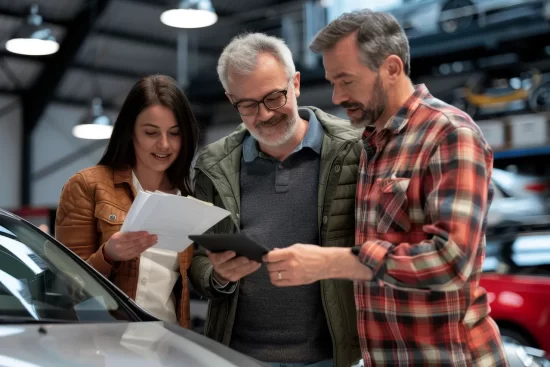
When buying a used car, one of the most important steps is checking its history. You want to know if it’s been in an accident, had major repairs, or been properly maintained. Today, this information is typically provided through services like Carfax or AutoCheck, but these reports often have gaps, inaccuracies, or even misleading data. Enter blockchain – a technology known for its transparency, security, and tamper-resistant design. In this article, we’ll explore how blockchain could transform vehicle history reports and why it matters to car buyers, sellers, and the automotive industry as a whole.
The Problem with Traditional Vehicle History Reports
Traditional vehicle history reports have their limitations:
- Incomplete Data – Not all repairs, accidents, or title changes are reported.
- Data Fraud – Odometer rollback and title washing are common scams.
- Lack of Transparency – Data is often controlled by a few large companies.
- Inconsistent Records – Different states and countries have varying reporting standards.
These issues can lead to costly surprises for buyers and impact the resale value of vehicles.
What is Blockchain and Why Use It for Vehicle History?
Blockchain is a decentralized, digital ledger that records transactions in a secure, transparent, and tamper-proof manner. Once data is added to the blockchain, it’s nearly impossible to alter or delete, making it ideal for maintaining accurate, long-term records.
Key Features of Blockchain:
- Decentralized – No single entity controls the data.
- Immutable – Once recorded, data cannot be changed or deleted.
- Transparent – Anyone with access can verify the information.
- Secure – Advanced cryptography protects data from unauthorized changes.
How Blockchain Could Improve Vehicle History Reports
1. Enhanced Data Accuracy and Integrity
With blockchain, every event in a vehicle’s life – from manufacturing to scrapping – can be recorded in real-time. This creates a transparent, chronological history that’s nearly impossible to alter.
Example Use Case:
- When a vehicle is manufactured, its VIN (Vehicle Identification Number) is added to the blockchain.
- Every subsequent event, like oil changes, accident repairs, or title transfers, is logged as a separate block, creating a complete, verifiable history.
Benefits:
- Reduced risk of fraud
- More accurate mileage tracking
- Better resale value for well-maintained vehicles
2. Reduced Fraud and Title Washing
Title washing, where vehicles with salvage titles are cleaned and resold as undamaged, is a major problem in the used car market. Blockchain can prevent this by permanently linking a car’s damage history to its VIN, making it difficult to hide past accidents or flood damage.
Benefits:
- Greater buyer confidence
- Fairer pricing for sellers
- Reduced insurance fraud
3. Streamlined Maintenance Records
Blockchain can also make it easier for owners and mechanics to access a vehicle’s complete maintenance history, leading to better diagnostics, faster repairs, and potentially lower insurance rates.
Benefits:
- Improved vehicle reliability
- Faster resale transactions
- Lower repair costs due to accurate diagnostics
4. Improved Recall Management
Automakers could use blockchain to track individual parts and components, making it easier to identify which vehicles are affected by recalls. This could significantly speed up the recall process and reduce the risk of missed repairs.
Benefits:
- Faster, more accurate recalls
- Reduced liability for manufacturers
- Improved consumer safety
5. Cross-Border Vehicle History
Unlike current systems that vary by state or country, a blockchain-based system could provide a unified, global record for each vehicle, making cross-border sales and imports more transparent.
Benefits:
- Simplified import/export process
- Better resale value for international buyers
- Consistent vehicle history across regions
Challenges and Roadblocks
While the potential benefits are clear, implementing blockchain for vehicle history isn’t without challenges:
- High Implementation Costs – Setting up and maintaining a global blockchain network is expensive.
- Data Privacy Concerns – Owners may worry about who can access their vehicle data.
- Industry Cooperation – Automakers, insurers, governments, and repair shops need to work together to standardize the system.
- Technical Hurdles – Integrating legacy systems with blockchain can be complex.
Real-World Examples
Several companies and startups are already exploring blockchain-based vehicle history solutions:
- CarVertical – Uses blockchain to provide real-time, decentralized vehicle history reports.
- VINchain – Offers a blockchain-based vehicle history platform with a focus on transparency and data security.
- MOBI (Mobility Open Blockchain Initiative) – An industry consortium focused on creating blockchain standards for the automotive sector.
Conclusion
Blockchain has the potential to revolutionize the way we track and verify vehicle history, making the process more transparent, secure, and reliable. While the technology is still in its early stages, its adoption could dramatically improve the used car market, reduce fraud, and boost buyer confidence. As the automotive industry continues to evolve, blockchain could play a critical role in building a more trustworthy, data-driven ecosystem.






Leave a Reply